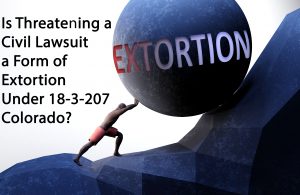Is Threatening a Civil Lawsuit a Form of Extortion Under 18-3-207 – Colorado?

By H. Michael Steinberg Colorado Criminal Defense Lawyer
It is common for threats of civil lawsuits to have the impact of a kind of extortion. Typically, one side blusters and threatens the other side with a lawsuit that will “destroy them” if they don’t settle in a way that is acceptable to the party making the threats.
The question is raised as to whether the person making this kind of threat is committing the crime of extortion. To answer that question, a close analysis of the complex crime of extortion is needed.
Criminal extortion is a poorly understood Colorado crime that I have addressed in other articles but a review of the crime is needed to answer this important question.
Under Colorado criminal law, the basic crime of extortion occurs when two essential elements are satisfied:
(i) a person, lacking legal authority to do so, makes a threat to confine the victim or cause economic, reputational, or physical harm to the victim, with the intent of coercing the victim to perform an act or refrain from performing an act, and
(ii) the person proposes to do so by resorting to an unlawful act or by threatening to invoke action by a third party, such as law enforcement. C.R.S. § 18-3-207(1)(a), (b).
A more common term for the crime of extortion is blackmail, a term often applied to the crime of extortion. But the term blackmail does not begin to address the complexity of the crime of extortion.
Blackmail is commonly defined as an act of coercion using the threat of revealing or publicizing either substantially true or false information about a person or people unless certain demands are met.
Blackmail usually involves publicly revealing damaging information or it may also involve using specific threats of physical, mental, or emotional harm against the victim or someone close to the victim.
All states and the federal government criminalize extortion. Extortion is typically nonviolent, but the elements of extortion are very similar to robbery, a crime considered a forcible theft offense.
Extortion has all of the elements of a criminal act” criminal intent, attendant circumstances, causation, and harm.
The Three Basic Types of the Colorado Crime of Extortion – and a Fourth Crime of Extortion – Immigration Status Extortion
There are three basic types of the Colorado crime of extortion and one very new version of the crime which involves a threat to expose a person’s illegal immigration status.
The three basic versions of the Colorado crime of extortion are:
The First Type is called “Unlawful Act Extortion.”
The elements of the crime of Unlawful Act Extortion are:
1. That the defendant,
2. in the State of Colorado, at or about the date and place charged,
3. without legal authority, and
4. with the intent,
5. to induce another person against that other person’s will to perform an act or to refrain from performing a lawful act,
6. made a substantial threat to confine or restrain, cause economic hardship or bodily injury to, or damage the property or reputation of, the threatened person or another person, and
7. threatened to cause the result[s] by performing or causing an unlawful act to be performed.
The Second Type of Extortion is called “Third Party Extortion”
The elements of the crime of “Third Party Extortion” are:
1. That the defendant,
2. in the State of Colorado, at or about the date and place charged,
3. without legal authority, and
4. with the intent,
5. to induce another person against that other person’s will to perform an act or to refrain from performing a lawful act,
6. made a substantial threat to confine or restrain, cause economic hardship or bodily injury to, or damage the property or reputation of, the threatened person or another person, and
7. threatened to cause the result[s] by invoking action by a third party, including but not limited to, the state or any of its political subdivisions, whose interests were not substantially related to the interests pursued by the defendant.
The Third Basic Type of Extortion is called Aggravated Extortion
The elements of the crime of Aggravated Extortion are:
1. That the defendant,
2. in the State of Colorado, at or about the date and place charged,
3. without legal authority, and
4. with the intent,
5. to induce another person against that other person’s will to perform an act or to refrain from performing a lawful act,
6. made a substantial threat to confine or restrain, cause economic hardship or bodily injury to, or damage the property or reputation of, the threatened person or another person, and
7. threatened to cause the result[s] by means of chemical, biological, or harmful radioactive agents, weapons, or poison
The Recent Creation of the Crime of “Immigration Status” Extortion
The elements of the crime of Immigration Status Extortion are:
1. That the defendant,
2. in the State of Colorado, at or about the date and place charged,
3. with the intent,
4. to induce another person against that other person’s will to give the defendant money or another item of value,
5. threatened to report to law enforcement officials the immigration status of the threatened person or another person.
Important Definitions to the Colorado Crime of Extortion
An “extortionate means” is any means which involves the use, or an express or implicit threat of use, of violence or other criminal means to cause harm to the person, reputation or property of any person
“Substantial threat” means a threat that is reasonably likely to induce a belief that the threat will be carried out and is one that threatens that significant confinement, restraint, injury, or damage will occur.
A Conviction for the Colorado Crime of Extortion Can Have Very Serious Consequences
The least serious form of the crime of Criminal Extortion is a Class 4 felony
Two to Six years in the Colorado Department of Corrections (prison) and/or a fine of between $2,000.00 to $500,000.00. (Parole is Three Years).
If, during the commission of the crime of Extortion, or in the immediate flight therefrom – the jury finds that the defendant threatened the use of, or possessed a deadly weapon or someone is killed or seriously injured, and the case is charged as “a crime of violence” the possible punishment for the crime increases to:
A mandatory Colorado Department of Corrections (prison) sentence of Five to Sixteen years, and/or a possible fine of $2,000.00 to $500,000.00. (Parole is Three years)
Aggravated Criminal Extortion
A conviction for Aggravated Criminal Extortion increases the felony to a Class 3 felony.
Four to Twelve years in the Colorado Department of Corrections (prison) and/or a fine of between $3,000.00 to $750,000.00. (Parole is Five Years).
If charged as a Crime of Violence – the penalty increases to:
A mandatory Colorado Department of Corrections (prison) sentence of Ten to Thirty-Two years, and/or a possible fine of $3,000.00 to $750,000.00. (Parole is Five years).
Extortion – An Analysis of the Credible Threat of Threatening to Sue
Colorado and Federal cases address the kind of threats that are chargeable as extortion have consistently held that generalized “threats” – such as threats to destroy a business or a reputation, without more, are not necessarily actionable. Again, a generalized threat to destroy a business or reputation does not, in and of itself, constitute extortion.
The threat must be explicit enough to possibly achieve that destruction through the performance of a particular unlawful act. In fact, prior versions of the crime of extortion have been held to be unconstitutional as lacking the clarity of the provisions of subsection § 18-3-207 (1)(b).
The prior versions of the Colorado extortion statute drew no distinction between threats to perform a ‘lawful’ and an ‘unlawful’ act.
When parties to litigation, in making threats in an attempt to settle a dispute before or during the filing of that lawsuit, threaten to engage in “brutal litigation” unless the other party agrees to accept a settlement offer, the cases considering these threats have refused to recognize the threat of abusive litigation as a form of extortion [because doing so] “would subject almost any unsuccessful lawsuit to a colorable extortion claim.”
Witt v. Snider Civil Action No. 16-cv-01303-MSK-CBS.
Threats of litigation to cause “economic hardship” are insufficient to prove the crime of criminal extortion.
Recall that a person commits criminal extortion § 18-3-207 if:
(a) The person, without legal authority and with the intent to induce another person against that other person’s will to perform an act or to refrain from performing a lawful act, makes a substantial threat to… cause economic hardship … to … the threatened person or another person; and
(b) The person threatens to cause the results described in paragraph (a) of this subsection (1) by:
(I) Performing or causing an unlawful act to be performed….
The recent Colorado case of People v. Knox contains an excellent analysis of this issue. In Knox, the Colorado Court of Appeals found that the overwhelming majority of jurisdictions addressing the unlawful act requirement have concluded that “a threat to litigate, by itself, is not necessarily “wrongful.”
Making a threat to do something while lacking express legal authority is not tantamount to committing an unlawful act. The defendant must make a threat to commit an unlawful act.
“After all, under our system, parties are encouraged to resort to courts for the redress of wrongs and the enforcement of rights.”
“Settlement implies a compromise; it does not establish conduct against one’s will.”
Zueger v. Goss, 343 P.3d 1028, 1038 (Colo.App. 2014)
Summary statement: The threat to sue, – giving your opponent the option to settle an alleged claim to avoid litigation – essentially making a threat of litigation, does not constitute criminal extortion.
If you found any information I have provided on this web page article helpful please share the article so that others may also find it.
Never stop fighting – never stop believing in yourself and your right to due process of law.
 ABOUT THE AUTHOR: H. Michael Steinberg – Email The Author at hmsteinberg@hotmail.com – A Denver Colorado Criminal Defense Lawyer – or call his office at 303-627-7777 during business hours – or call his cell if you cannot wait and need his immediate assistance – 720-220-2277. Attorney H. Michael Steinberg is passionate about criminal defense. His extensive knowledge of Colorado Criminal Law and his 42 plus years of experience in the courtroom Colorado Criminal Law gives him the edge you need to properly defend your case.
ABOUT THE AUTHOR: H. Michael Steinberg – Email The Author at hmsteinberg@hotmail.com – A Denver Colorado Criminal Defense Lawyer – or call his office at 303-627-7777 during business hours – or call his cell if you cannot wait and need his immediate assistance – 720-220-2277. Attorney H. Michael Steinberg is passionate about criminal defense. His extensive knowledge of Colorado Criminal Law and his 42 plus years of experience in the courtroom Colorado Criminal Law gives him the edge you need to properly defend your case.
 Colorado Criminal Lawyer Blog
Colorado Criminal Lawyer Blog

